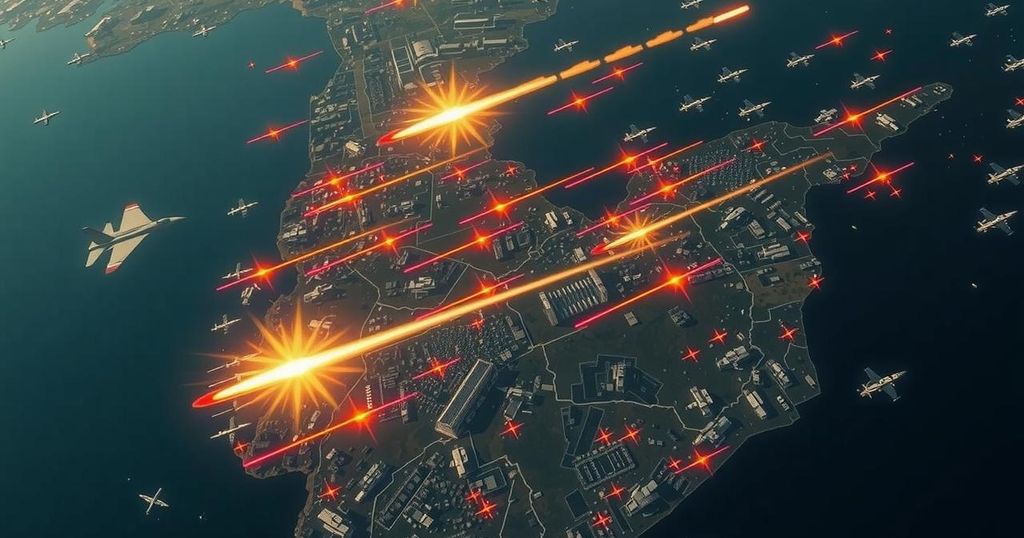Israel has intensified military actions against Hezbollah in Syria while the United States has targeted Houthi rebels in Yemen. These developments occur against a backdrop of increased tensions following Iran’s missile strike on Israel. Both military operations point to a significant escalation in regional conflicts, leading to high civilian casualties and humanitarian crises.
On Thursday, Israel conducted a strike against a Hezbollah target in Syria, while the United States targeted Houthi rebel positions in Yemen. This military activity follows the recent escalation of conflict in Lebanon, which has been ongoing for nearly a month. The entities involved—including Syria, the Houthis in Yemen, Hezbollah in Lebanon, and Hamas in Gaza—are part of an “axis of resistance” aligned with Iran, which recently launched a missile attack on Israel on October 1, prompting Israel’s vow of retaliation. Iranian Revolutionary Guards chief Hossein Salami warned that Iran would respond powerfully if Israel attacked Iranian targets. Reports from Syrian state media indicated that an Israeli strike on Latakia, a key city for President Bashar al-Assad, left two civilians injured. The Syrian Observatory for Human Rights reported that the attack targeted a Hezbollah weapons depot. Israel has previously carried out numerous strikes in Syria aimed at disrupting Hezbollah’s supply routes from Iran. Simultaneously, U.S. forces carried out multiple B-2 bomber strikes on Houthi-controlled weapon storage sites in Yemen, signaling a possible shift in U.S. policy toward a more aggressive response to Houthi actions. Mohammed al-Basha, a security analyst, noted that the use of heavy bombers reflects Washington’s intent to counter the group’s destabilizing actions. In response, the Houthis declared that American aggression would not go unanswered and pledged continued support for Gaza and Lebanon. The regional conflict has escalated alongside the violence in Gaza, which has resulted in significant casualties following Hamas’s October 7 attack on Israel. According to reports, the Israeli military has conducted extensive operations in Gaza, leading to a tragic death toll of over 42,000, predominantly civilians. Additionally, Israel’s campaign against Hezbollah in Lebanon has resulted in further casualties and displacement, with numerous strikes causing widespread destruction and civilian suffering. The international community, including the United States, has expressed concern regarding the impact of Israeli operations on civilian lives and infrastructure. Recent statements from White House Press Secretary Karine Jean-Pierre emphasized that U.S. communications to Israel highlighted the importance of avoiding civilian harm. In summary, the continuing conflict, now multifaceted with active operations in Syria, Yemen, and Lebanon, displays a growing humanitarian crisis exacerbated by military actions that threaten regional stability. Both the Israeli and U.S. military operations reflect a broader strategy to confront groups associated with Iran, yet simultaneously raise alarms about potential escalations in violence and humanitarian impacts.
The situation surrounding Israel, Syria, and the broader Middle East is complex and interwoven with relations among various groups aligned with Iran. Recent military engagements by Israel and the United States underscore escalating tensions, especially following a missile strike by Iran on Israel on October 1, 2023. These engagements highlight long-standing conflicts between state actors and non-state militant groups, with the region experiencing multifront warfare that could potentially escalate further if diplomatic resolutions are not achieved. The humanitarian consequences of these conflicts, particularly in Gaza and Lebanon, present critical challenges for international relations and humanitarian efforts.
The current military actions by Israel and the United States illustrate a broader context of conflict in the Middle East characterized by retaliatory strategies against groups aligned with Iran. As both nations execute their respective operations, the resulting humanitarian crises in affected regions raise serious concerns for international communities. It is imperative that greater diplomatic efforts be engaged to prevent further escalation and to address the dire humanitarian conditions faced by civilians.
Original Source: www.newarab.com






